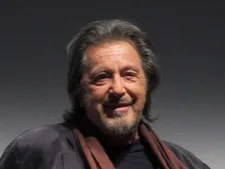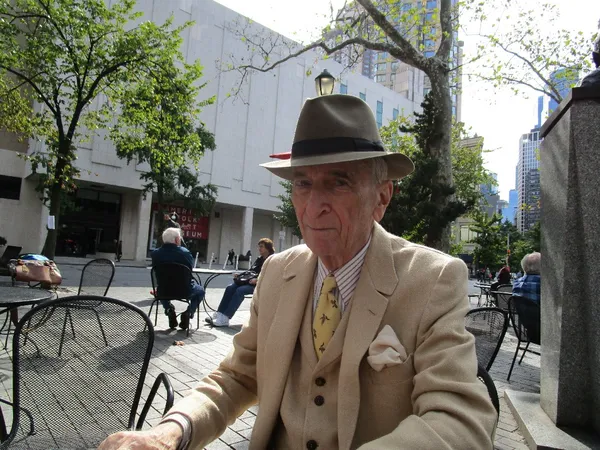 |
| Gay Talese on The Irishman, Casino, Goodfellas, Mean Streets, and Francis Ford Coppola's The Godfather: "Urban westerns is what they are." Photo: Anne-Katrin Titze |
Gay Talese, a longtime friend to Martin Scorsese going back to the director's Mean Streets days, shared with me his views on The Irishman, shot by Rodrigo Prieto (The Wolf Of Wall Street, Silence), edited by Thelma Schoonmaker, starring Robert De Niro, Al Pacino and Joe Pesci with an extraordinary supporting cast that includes Harvey Keitel, Bobby Cannavale, Ray Romano, Stephen Graham and Jack Huston.
The story, based on Charles Brandt’s nonfiction book, I Heard You Paint Houses, screenplay by Steven Zaillian, is that of hit man Frank Sheeran (De Niro), his mentor, Pennsylvania mob boss Russell Bufalino (Pesci) and their intricate connections to the notorious union leader and Teamster President Jimmy Hoffa (Pacino).
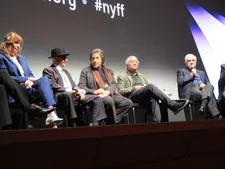 |
| The Irishman producer Jane Rosenthal, Joe Pesci, Al Pacino, Robert De Niro, and Martin Scorsese Photo: Anne-Katrin Titze |
With the help of the latest digital de-aging technology, which you forget about after a few seconds, Scorsese and his splendid crew (fantastically detailed costumes by Sandy Powell and Christopher Peterson and production design by Bob Shaw) give a sense of times past, meanwhile creating a timely visitation of where the now was born.
This is what roots The Irishman’s questions: What does it mean to do your job when that job involves killing people? What is the effect on your family? What does loyalty actually look like? How does the experience of war change everything? A broken double bracket, starting in a nursing home tale about a road trip, makes personal and national memories come alive.
Much more than a history of post-war organised crime, the film spans decades, with the focus on the Fifties, Sixties and Seventies, plus a jump further back to the Second World War and a frame narrative closer to the present.
If Hitchcock has written the handbook of suspense, Scorsese has just added a new chapter to it. A dialogue regarding the transport of fish in a car, is a most brilliant lesson in moviemaking about how much can be accomplished at the same time, in one absurd, thrilling scene.
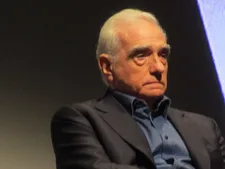 |
| Gay Talese on Martin Scorsese: "He's unlike a lot of directors who are very private. He is a very good mixer." Photo: Anne-Katrin Titze |
Anne-Katrin Titze: I saw The Irishman here across the street at Alice Tully Hall on the opening day of the New York Film Festival and I loved it.
Gay Talese: I've known Martin Scorsese as long as I've known of Scorsese. His wife is an old friend of mine from Random House, Helen Morris. And I knew him in the early Seventies, when he did Mean Streets. More or less the inception of his career was Mean Streets.
And then the other day I saw The Irishman. I thought he just looped around to his past. It was like a continuous Scorsese for over a fifty year period with some of the same actors. Himself ageing but not ageing so much that it was out of context with Mean Streets. This is Mean Streets revisited, is what it is.
AKT: But with experience, with life experience added, I thought.
GT: Yes, and the experience of the indefatigable De Niro. How he can be so versatile as an actor is just astonishing. And also, I thought one of the real surprise features of The Irishman was Joe Pesci. I mean, he's always the bumbling nasty foulmouth person, as he was in Goodfellas, in Casino and whatever. This time he's not a foulmouth, he's a rather avuncular crusty old guy with a kind of soft side to him. And I thought this is one of the crowning achievements. He's out of retirement. He now should be back.
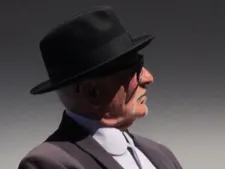 |
| Gay Talese on Joe Pesci in The Irishman: "I thought this is one of the crowning achievements. He's out of retirement. He now should be back." Photo: Anne-Katrin Titze |
AKT: After that?
GT: I mean it's like the best role of his life! And also of course Pacino as Hoffa is terrific. Now the writer - I guess, like most people, I didn't know the book. I didn't know [Brandt’s] I Heard You Painted Houses. When I saw the Pacino performance and his diatribe as he's making speeches to his fellow union leaders and he's screaming and ranting - I wondered, could that be in the book? Or is it improvised? I mean you don't know with these great actors, sometimes they improvise off a script and you don't know to what degree they're creative or following the words of the playwright or screenwriter.
In any case, it was a great climax to the longterm careers of the guys out of The Godfather. They all kind of graduated Mean Streets and then by virtue of Coppola sneaking in there with his own genius. Those actors were graduates of The Godfather and they continue on playing anti-social characters.
They're the supreme depicters of anti-social characters. Whether it's Hoffa or Don Corleone, whether it's some crooked cop who gets shot violently in a bar or a restaurant. So what we're getting is a picture of the underside of American democracy. We're getting a sense of corrupt capitalism. Because the Mafia is really about corrupt capitalism and how the people that are nefarious in one sense, criminal in all senses, are so heroic in another sense.
And the American public gravitating to such films as this. Urban westerns is what they are. I mean, we all like the John Wayne and shoot-'em-up, you know, make-my-day kind of film in a western setting. This is the urban setting, the counterpart of it with these guys with dark glasses and lurking in the shadows with pockets filled with guns and a lot of rage in their brains. Wonderful.
AKT: It also has a lot to do with a fascination with loyalty.
GT: I understand. It's kinship. The underworld is the underworld of a nation unrecognised, an alliance unrecognised, criminal by nature. Only because it's contrary to the rule of the land. The rule of the land can be corrupt too. So we have two levels of corruption. We have official corruption, like in government. Watergate is filled with corruption.
And then you have the underworld, operating under its own aegis, its own rules, its own dictums, its own values. Loyalty - it's still loyalty whether you're in a Marine Corps, whether you're working with the United States Government as an FBI … is loyalties. And loyalty equally dominates the world of the subculture. This is a subculture. Scorsese is a supreme artist of the subculture world.
AKT: I loved the structure of the film. The idea of having the cigarette breaks, the fact that the women need their cigarette breaks, as a structuring device to point us back in time and allow the trigger of memories. It's funny.
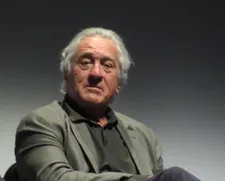 |
| Gay Talese on Robert De Niro: "How he can be so versatile as an actor is just astonishing." Photo: Anne-Katrin Titze |
GT: You know, Lauren Bacall always had a cigarette in her mouth. With Bogart. So this is evoking a nostalgia. Not vaping anymore. Cigarettes is kind of good. Now vaping is a big crime in the nation. No, this evokes a period when smoking was not so terrible. Even if it was, it wasn't considered such. And it was acting glamorous.
AKT: We are so far away from that. I talked with Olivier Meyrou recently, who made a film on Yves Saint Laurent, called Celebration. The American poster shows Yves Saint Laurent smoking. Here it's fine to show that old image with the cigarette.
He told me that in France you can't have a poster with a cigarette. Because there is still some of the glamour or attitude to it, while in the US we are so far removed from it, as if the image can do no harm anymore.
GT: You know, I'm so old. I came to New York in the 1950s and I worked at The New York Times in Times Square. One of the big features of Times Square in the 1950s was this big Camel cigarette sign. And out of the mouth of this man, smoke rings evolved. Did you ever see pictures of that?
AKT: Yes, I've seen pictures of it.
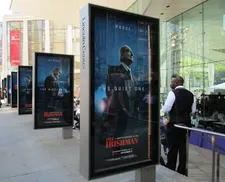 |
| The Irishman posters at Alice Tully Hall Photo: Anne-Katrin Titze |
GT: Interesting, people would stand and gather and watch the smoke rings coming. It was like an epiphany, it was like a religious experience. It was like smoke coming out of the Vatican as they elected a new Pope.
AKT: That's funny. What did you talk about with your friend Martin Scorsese after the screening?
GT: I congratulated him and I told him how it was thrilling to see his endurance, his perseverance as an artist. I said, "You know, you're a genius, let's face it you're a genius." He smiled. We talked about his dear wife Helen. He said he's going to take her to Europe to see this. She wasn't there at that screening. He's very engaging.
He's unlike a lot of directors who are very private. You know, they don't want to deal with outside their realm of artistry, they don't mix with the public so well. He is a very good mixer. He's a very social person. And he clearly likes the public. He likes being who he is.
AKT: He makes such smart decisions in his films. From the angles of shots to costumes.
GT: That's right. Your eyes are stimulated throughout. From the women smoking on the side of the car throughout the film. Of course, the already celebrated scene at the beginning when you're in the hospital, going through the hospital, just like the other film, was it Casino? Going through the Copacabana. You see Scorsese hanging on to the camera and following through halls and going into back rooms of kitchens or inside a hospital ward - amazing.
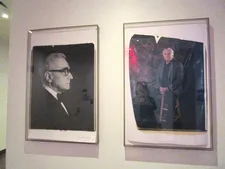 |
| Martin Scorsese and Robert De Niro photos at the Elinor Bunin Munroe Film Center Photo: Anne-Katrin Titze |
AKT: Did the de-ageing bother you? It didn't bother me at all.
GT: No, it seemed natural.
AKT: More natural than having two actors play the same role.
GT: Absolutely.
AKT: It has become already one of my favourite Scorsese films, because, as you say, he has come full circle. But it's coming to us full circle with wisdom. It's a film he couldn't have made as a younger man.
GT: That's true.
AKT: It's time now, we have to walk over to the theatre to see The Booksellers.
The Irishman had its world premiere as the Opening Night Gala selection of the New York Film Festival and will be released in select theatres in the US on November 1 and on Netflix later in the year.








